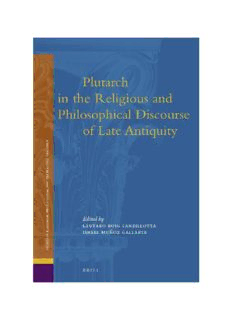Table Of ContentPlutarch in the Religious
and Philosophical Discourse
of Late Antiquity
Ancient Mediterranean
and Medieval Texts
and Contexts
Editors
RobertM.Berchman
JacobNeusner
Studies in Platonism, Neoplatonism,
and the Platonic Tradition
Editedby
RobertM.Berchman
DowlingCollegeandBardCollege
JohnF.Finamore
UniversityofIowa
EditorialBoard
JOHNDILLON(TrinityCollege,Dublin)–GARYGURTLER(BostonCollege)
JEAN-MARCNARBONNE(LavalUniversity,Canada)
VOLUME14
Thetitlespublishedinthisseriesarelistedatbrill.com/spnp
Plutarch in the Religious
and Philosophical Discourse
of Late Antiquity
Editedby
LautaroRoigLanzillotta
IsraelMuñozGallarte
LEIDEN•BOSTON
2012
LibraryofCongressCataloging-in-PublicationData
Plutarchinthereligiousandphilosophicaldiscourseoflateantiquity/editedbyLautaroRoig
Lanzillotta,IsraelMuñozGallarte.
pages.cm.–(AncientMediterraneanandmedievaltextsandcontexts;volume14)
PapersfromtheXICongressoftheInternationalPlutarchSocietyheldJune2010.
Includesbibliographicalreferencesandindex.
ISBN978-90-04-23474-1(hardback:alk.paper)–ISBN978-90-04-23685-1(e-book)
1.Plutarch–Congresses.2.Philosophy,Ancient–Congresses.I.RoigLanzillotta,Lautaro.II.
MuñozGallarte,Israel.III.InternationalPlutarchSociety.IV.Series:AncientMediterraneanand
medievaltextsandcontexts;v.14.
PA4382.P592013
184–dc23
2012032857
Thispublicationhasbeentypesetinthemultilingual“Brill”typeface.Withover5,100
characterscoveringLatin,IPA,Greek,andCyrillic,thistypefaceisespeciallysuitablefor
useinthehumanities.Formoreinformation,pleaseseewww.brill.com/brill-typeface.
ISSN1871-188X
ISBN978-90-04-23474-1(hardback)
ISBN978-90-04-23685-1(e-book)
Copyright2012byKoninklijkeBrillNV,Leiden,TheNetherlands.
KoninklijkeBrillNVincorporatestheimprintsBrill,GlobalOriental,HoteiPublishing,
IDCPublishersandMartinusNijhoffPublishers.
Allrightsreserved.Nopartofthispublicationmaybereproduced,translated,storedin
aretrievalsystem,ortransmittedinanyformorbyanymeans,electronic,mechanical,
photocopying,recordingorotherwise,withoutpriorwrittenpermissionfromthepublisher.
AuthorizationtophotocopyitemsforinternalorpersonaluseisgrantedbyKoninklijkeBrillNV
providedthattheappropriatefeesarepaiddirectlytoTheCopyrightClearanceCenter,
222RosewoodDrive,Suite910,Danvers,MA01923,USA.
Feesaresubjecttochange.
Thisbookisprintedonacid-freepaper.
CONTENTS
Preface.................................................................. vii
Abbreviations........................................................... xi
ListofContributors..................................................... xv
Introduction:PlutarchattheCrossroadsofReligionandPhilosophy .. 1
LautaroRoigLanzillotta
I
PLUTARCHANDPHILOSOPHY
PlutarchontheSleepingSoulandtheWakingIntellectand
Aristotle’sDoubleEntelechyConcept.............................. 25
AbrahamP.Bos
TheDoctrineofthePassions:Plutarch,PosidoniusandGalen ......... 43
FrancescoBecchi
TheAdventitiousMotionoftheSoul(Plu.,DeStoic.repugn.23,
1045B–F)andtheControversybetweenAristoofChiosandthe
MiddleAcademy ................................................... 55
RaúlCaballero
Plutarchand“PaganMonotheism” ..................................... 73
FrederickE.Brenk
SocratesandAlcibiades:ANotoriousσκάνδαλονintheLaterPlatonist
Tradition ........................................................... 85
GeertRoskam
SaltintheHolyWater:Plutarch’sQuaestionesNaturalesinMichael
Psellus’Deomnifariadoctrina ...................................... 101
MichielMeeusen
vi contents
II
PLUTARCHANDRELIGION
IacchusinPlutarch ..................................................... 125
AnaIsabelJiménezSanCristóbal
Plutarch’sIdeaofGodintheReligiousandPhilosophicalContextof
LateAntiquity...................................................... 137
LautaroRoigLanzillotta
PlutarchasApollo’sPriestatDelphi.................................... 151
AngeloCasanova
Plutarch’sAttitudetowardsAstralBiology ............................. 159
AurelioPérezJiménez
“Cicalatasulfascinovolgarmentedettojettatura”:Plutarch,Quaestio
convivalis5.7........................................................ 171
PaolaVolpeCacciatore
TheEleusinianMysteriesandPoliticalTimingintheLifeof
Alcibiades........................................................... 181
DelfimF.Leão
Μυστηριώδηςθεολογία:Plutarch’sfr.157SandbachbetweenCultual
TraditionsandPhilosophicalModels............................... 193
RosarioScannapieco
ANon-FideisticInterpretationofπίστιςinPlutarch’sWritings:The
HarmonybetweenπίστιςandKnowledge.......................... 215
GeorgevanKooten
TheColorsoftheSouls ................................................. 235
IsraelMuñozGallarte
Bibliography............................................................ 249
Indexlocorum.......................................................... 275
Indexrerum ............................................................ 294
Indexnominum ........................................................ 298
PREFACE
ThisbookincludesthereworkedversionsofthepaperspresentedattheXI
CongressoftheInternationalPlutarchSociety(section:RéseauThématique
Plutarque):“PlutarchintheReligiousandPhilosophicalDiscourseofLate
Antiquity”, which I had the pleasure to organize, together with Dr Israel
MuñozGallarte,attheUniversityofGroningen’sFacultyofTheologyand
ReligiousStudiesfromJune2–5,2010.Itincludesfifteenpapersbyrenowned
Europeanscholars:sixpapersfocusonphilosophicalmattersandtheother
nineonreligiousissues.
TheDepartmentofJewish,ChristianandIslamicOrigins,inwhichIwork
asseniorLecturerinNewTestamentandEarlyChristianStudies,paysspe-
cialattentiontotheculturalenvironment(social,philosophical,religious,
politicalandhistoricalcontexts)inwhichancientwritingswereproduced
and consumed. Given the time span that separates us from the first cen-
turies of late antiquity and our ignorance about numerous aspects of the
multiculturalsocietyinwhichwritersandreaderslived,reconstructingthe
culturalenvironmentinwhichandforwhichtextswerecomposedappears
tobeanessentialpartofthedevelopmentofexegetes’interpretations.The
testimonyofinsidersandexternalobserversispreciousforthisreconstruc-
tion.
TheworksofPlutarch,notablyhisMoraliabutalsohisLives,provideus
withexceptionalevidence,sincetheycoverbothperspectives.Astothefor-
mer,asapriestofApolloatDelphihewitnessedpaganreligionandancient
religiousexperience;asaMiddlePlatonisthewasalsoactivelyinvolvedin
the developments of the philosophical school and provided unique testi-
monyforconceptualissuesthatwouldonlyachievedefinitiveforminPlot-
inusandNeoplatonism.Astothelatter,Plutarchwasasensitivechronicler
ofeventsheexperiencedinalessdirectmannerandoftenprovidedamore
detached point of view about the numerous religious practices and cur-
rentsthatpermeatedthebuildingofancientpaganreligionandthephilo-
sophicalviewsofotherschools.Theconferenceaimedtotakeadvantageof
Plutarch’sprivilegedpositionasanobserverofthephilosophicalandreli-
giousworldsoflateantiquitytoassessanumberofissuesthatarerelevant
forthereconstructionoftheculturalatmosphereofthefirstcenturiesofthe
era.
viii preface
As far as the philosophical world is concerned, the essays in this book
assess Plutarch’s testimony to Aristotle’s influence on Middle Platonism
(A.P. Bos, Amsterdam), Plutarch’s position within Middle Platonism as
viewedthroughacomparisonbetweenhisownconceptionsofthepassions
andthoseofPosidoniusandGalen(F.Becchi,Florence)andhistestimony
regardingthecontroversybetweentheStoaandtheMiddleAcademy(Raúl
Caballero,Malaga).PaganmonotheismfromtheMiddlePlatonicperspec-
tive(F.Brenk,Rome),therelationshipbetweenSocratesandAlcibiadesin
later Platonic tradition (G. Roskam, Leuven) and Michael Psellus’ use of
Plutarch’sQuaestionesnaturales(M.Meeusen,Leuven)completethesec-
tion.
Asforthereligiousworld,thesectionopenswithanevaluationofPlu-
tarch’stestimonyabouttheprocessionofIacchusfromAthenstoEleusis,
withaviewtodeterminingwhetherthenameIacchusreferstoDionysus
ortoadifferentdeity(A.Jiménez,Madrid).Plutarch’sideaofgod,inturn,
isestablishedbyananalysisofhisviewsonHerodotus’religiosityandthe
MiddlePlatonicargumentsusedtoassessit(L.RoigLanzillotta,Groningen).
A review of Plutarch’s experience as a priest of Apollo (A. Casanova, Flo-
rence) completes the study of his theological views. Popular religiosity is
thefocusoftwostudies:Plutarch’sviewsregardingastralbiology(A.Pérez
Jiménez, Malaga) and the analysis of ancient beliefs about the evil eye,
whichN.Vallettacalled“jettatura”(P.VolpeCacciatore,Salerno).Therela-
tionshipbetweenreligionandpoliticsasreflectedbytheEleusinianMys-
teriescomestotheforeinPlutarch’sLifeofAlcibiades(D.Leão,Coimbra),
whileananalysisoffr.157Sandbacharguesthattheviewofa“mystery-like
theology” provides a comprehensive vision of physical and metaphysical
realities(R.Scannapieco,Salerno).AnanalysisofthetermpistisinPlutarch
argues that fideistic interpretations need to be revised (G. van Kooten,
Groningen)andacomparisonofthecolorsofthesoulbothinPlutarchand
theapocryphalActsofJohn(IsraelMuñozGallarte,Groningen)closesthe
book.
Thisconferencewouldnothavebeenpossiblewithouttheclosecollab-
orationofmyfriendandcolleagueDrIsraelMuñozGallarte.Afterourfirst
enthusiasticconversationsinSeville,heprovidedthenecessaryimpetusto
ourplansinParis,whichultimatelyledtotheircrystallizationinGroningen.
Hisrolewascrucialbothinthepreliminarycontactswiththemembersof
the“Réseau”andinorganizingtheGroningenmeeting.
Manypeopleactivelycontributedtotheorganizationofthisconference.
Thedeanofourfaculty,Prof.G.vanKooten,lenthiscompletesupporttothe
organization,andtheGUF(GroningerUniversiteitsFonds)andtheFaculty
preface ix
ofTheologyandReligiousStudieskindlyprovidedthenecessaryfinancial
supportfortheevent.SpecialthanksarealsoowedtoM.WubboltsandMir-
jamBuigel,whosehelpandexperienceensuredthesuccessfulorganization
oftheconference.
Differentpersonsreadthemanuscriptatdifferentstagesandenriched
itwithnumerouscorrectionsandsuggestions.Especialthanksaredueto
LoukeBoulens,JuliaHarveyforhercontinuoussupportandtomydearand
eruditefriendAlasdairA.MacDonald.
Description:The works of Plutarch, notably his Moralia, provide us with exceptional evidence to reconstruct the spiritual and intellectual atmosphere of the first centuries CE. As a priest of Apollo at Delphi, Plutarch was a first range witness of ancient religious experience; as a Middle Platonist, he was also

